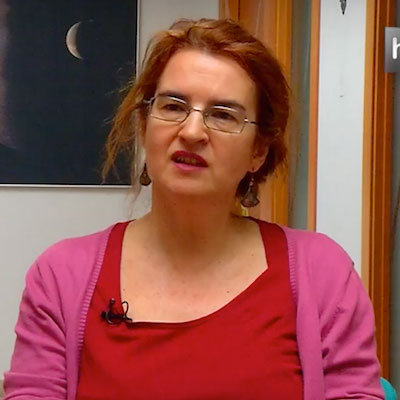Core Team

- lourdes@iaa.es
-
Dpto. Astronomía Extragaláctica
Instituto Astrofísica Andalucía
Glorieta de la Astronomía s/n
18008 Granada
Spain
I consider as a milestone in my career that, starting from an education in fundamental science, my motivations have led me to add a technological component to my profile, mobilising an entire community to get involved in what will be the largest scientific infrastructure on Earth: the Square Kilometre Array Observatory (SKAO). This has been achieved thanks to a continued support and interaction with the Spanish SKA community.
My research focuses on the multifrequency analysis of galaxy evolution, with emphasis on the study of atomic gas (HI) in extreme, well-defined environments. In Verdes-Montenegro+2001 I proposed an evolutionary sequence to explain the extreme gas deficiency of compact groups of galaxies (constant citations/year, total >230) still subject of study by international teams. In 2021 I got time for study them as PI in the first international call of MeerKAT (one of the 4 SKA precursors), with 30 international collaborators. My proposal has been ranked 4th among 150, and the observations are providing an unprecedented view of these systems, key in galaxy evolution. In 2003 I identified the need to build and characterise a sample of isolated galaxies, the AMIGA project.
I considered it essential to form a multidisciplinary team with experts in computer science, being pioneers in e-Science and Open Science (OS) applied to radio astronomy and the achievement of the Sustainable Development Goals.
I led the Project of Excellence “e-CA: e-Ciencia Andaluza” (2007-2010), the first bottom-up initiative in Spain, reaching more than 140 Andalusian groups, companies and computing centres. Between 2010 and 2013 I coordinated a WP of the FP7 project “Wf4Ever” for OS developments. Between 2015 and 2019 I was a member of the Board of the SKA Science Data Processor design consortium. In 2020, established as a community leader in promoting SKA and as a reference in OS and Inclusion, I was invited to coordinate the incorporation of OS in key SKAO documents.
I have published >90 articles (50% in the last 10 years) in international journals (>3000 citations), 11 books/chapters and 30 technical reports. My >250 conference presentations include 42 invited talks. As PI I have led 16 national and regional projects and participated in 5 European projects. I have organised >35 conferences/workshops. Between 2017 and 2019 I was invited to be Co-chair of the SKA Science Working Group “HI & galaxy evolution”.
Since 2005 I have worked to promote the participation of Spain in instrumental projects. Between 2005 and 2007 I accepted the position of Deputy Director of Technology Affairs at the IAA. In 2011 I started to coordinate the participation of Spain in SKA. As a result, ~75 Spanish researchers have joined SKA committees. More than 24 centres and companies have collaborated in its design, resulting in a well-positioned industry for construction contracts. Spain joined the SKA Organization in 2018 and I was appointed by the Ministry as Science Director on its Board. I have participated, as a member of the Spanish Delegation, in the 5 Councils of the new SKAO.
The experience of decades in radio astronomy, e-Science and Open Science, and the national coordination of SKA, have led my team to promote the development of a Spanish SKA Regional Center (SRC) at the IAA, making this a hub for the exchange of knowledge according to the principles of OS. The development of a SRC Prototype that I coordinate has been a strategic part of the Severo Ochoa program of the IAA since 2019. My team already provides scientific and technical support for access to data, computation and analysis tools, preparing and positioning the community to maximize the scientific return of SKA. I represent Spain in the SRC Steering Committee.
I consider that my interest in developing research in an integral way, a passion for teamwork, and demonstrated ability to raise funds, have played a key role for the supervision of a total of 48 people since 2002, including undergraduate students, doctoral students, postdocs, engineers, communicators and managers. Since 2003 I have formed a team with diversity and equality as key values, maintaining parity at all levels and tasks and with members from several countries. A nucleus of astronomers and engineers was formed around my research and technological activities, giving rise to 9 doctoral theses (6 supervised by me and 3 by collaborators).
Participating in a planetary scale project is giving me the unique opportunity to train professionals in Africa, promote STEM vocations and gender equality, and change the way we do science, encouraging collaboration versus competitiveness. Open Science, in addition to being key to the Scientific Method, is crucial to promote equality, diversity and inclusion, by providing a tool for the objective evaluation of work, especially in the case of women scientists in places where their contribution tends to be ignored or anonymized, while accelerating the transfer of knowledge to society. My commitment to these principles led me to be invited to give a lecture on “Open Science for sustainability and Inclusiveness: the SKA role model” in Science Digital at 75th United Nations General Assembly and also to win this year the Ada Byron Prize for women in technology, organised by the University of Deusto, for my scientific, technological and management career.